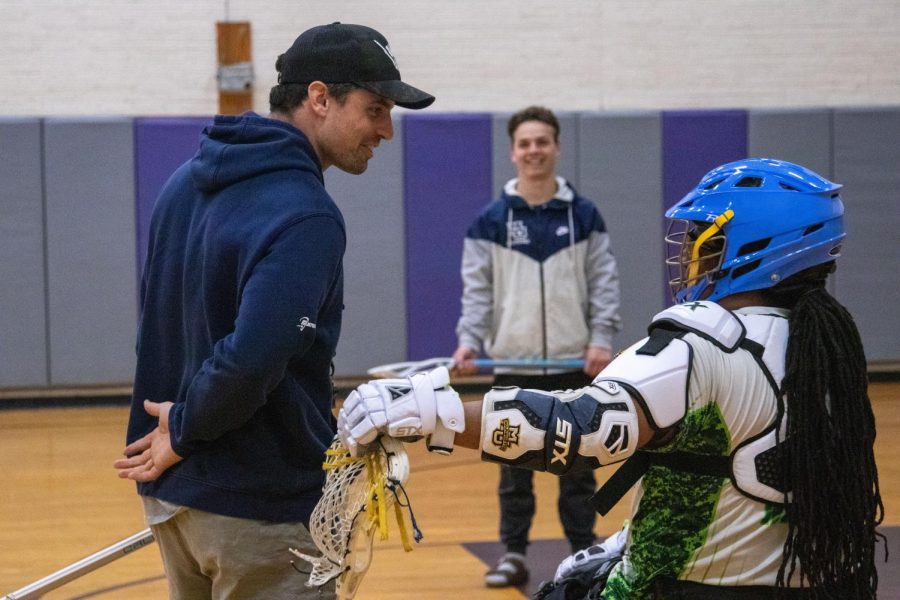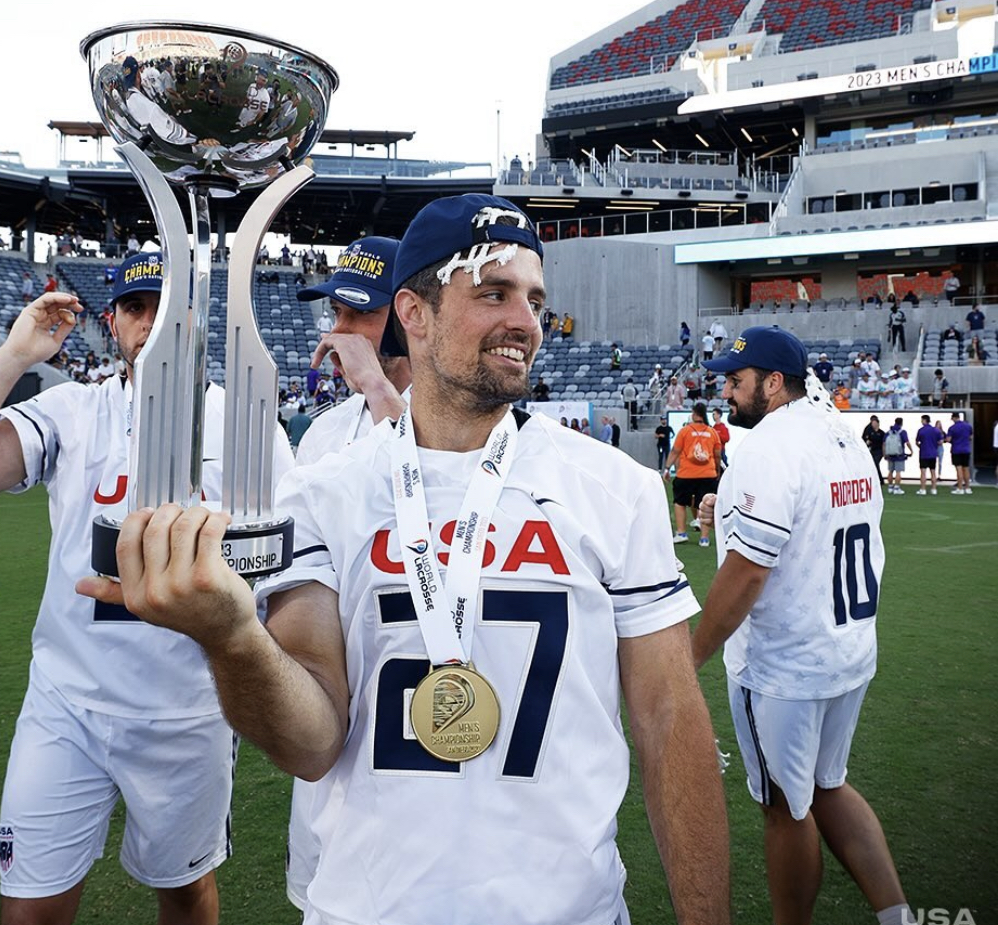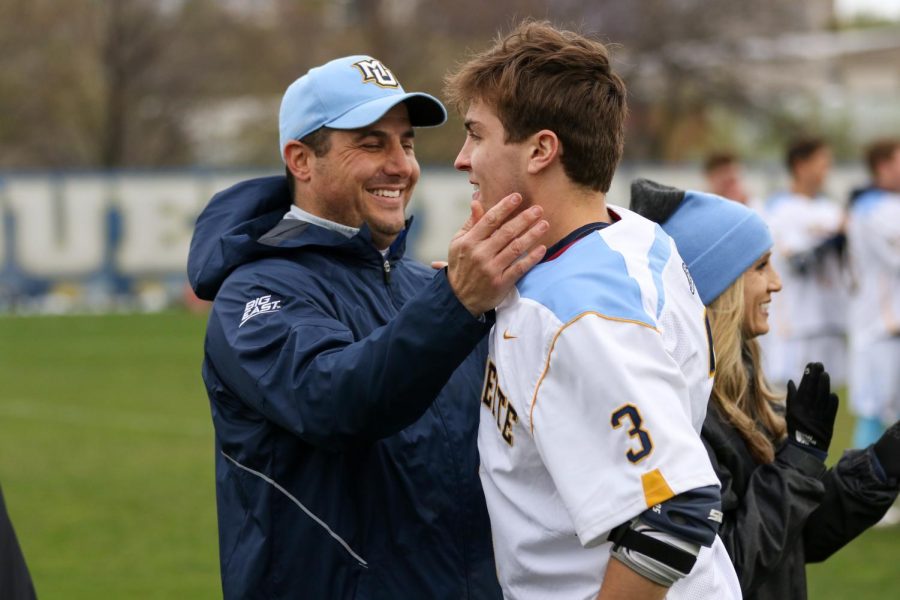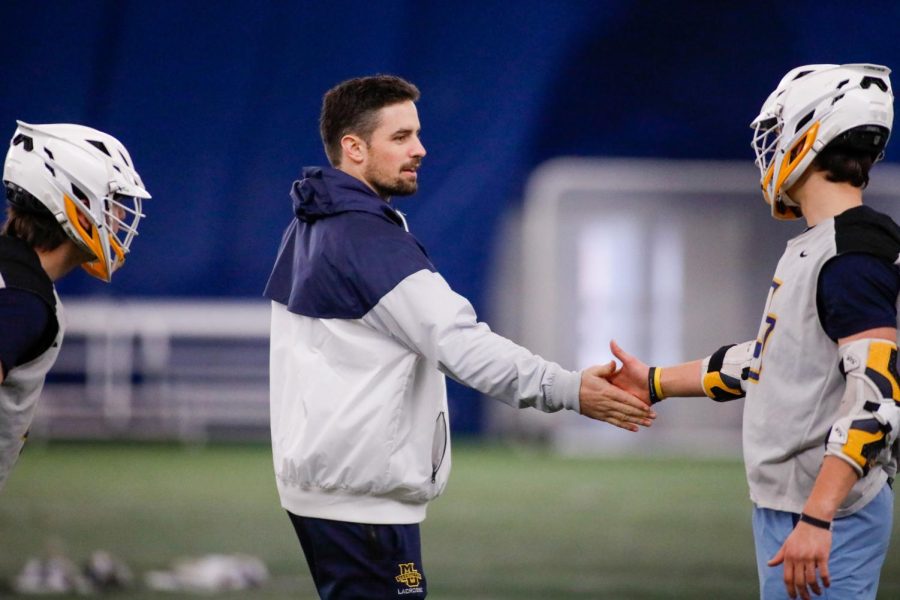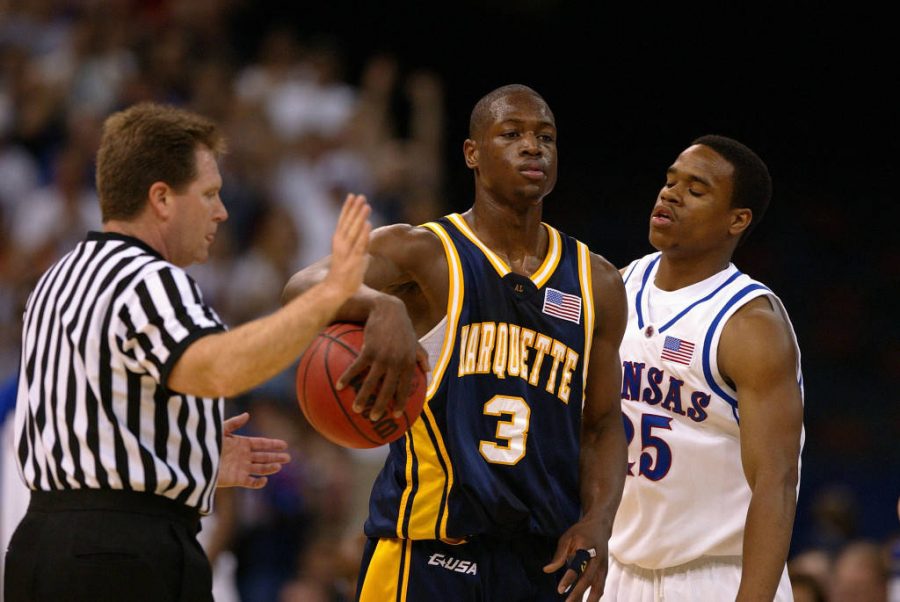Cudahy High School may be the “Home of the Packers,” but on Monday evenings, the small back gym becomes home to none other than the Milwaukee Eagles Wheelchair Lacrosse team.
Propped open with a plastic bucket, the back gym door leads directly to a parking lot of cracked pavement and faded white lines. With quick and purposeful steps, Dr. Kenneth Lee hauls loads of equipment from his trailer through the door.
Without Lee, the chief of Spinal Cord Injury Division at the Milwaukee VA, there would be no practice. In fact, there would likely be no team at all.
“In 2015, a couple of the veterans and I went to Las Vegas for a wheelchair lacrosse clinic,” Lee said. “I didn’t know what it was, but I fell in love with it. When I came back (to Milwaukee), the vets wanted to form a team. Since I had no idea how to even play lacrosse, I reached out to then head coach of Marquette men’s lacrosse, Joe Amplo. Right away, he said this was a great project for his athletes, so we hooked up and from then on, we had the Milwaukee Eagles wheelchair lacrosse team.”
Officially formed in 2016, the Milwaukee Eagles are one of 13 total members of Wheelchair Lacrosse USA (WLUSA). For the past seven years, a close bond between Marquette men’s lacrosse and the Eagles has taken shape.
Current Marquette assistant coach and head coach of the Milwaukee Eagles Jake Richard has been volunteering with the Eagles program since his days of playing in blue and gold.
“I was in the same shoes as a lot of the guys out here helping, just a student-athlete on the team that was really excited about the opportunity,” Richard said. “I actually had a brother that grew up in a wheelchair, so being involved in these kinds of activities were near and dear to my heart. Once I was involved as (a) student-athlete, I made a lot of great relationships with really great people here and couldn’t walk away. It’s been amazing to see all of them grow.”
From Lee’s perspective, he said growth for the players happens on and off the game clock.
“Having a disability doesn’t mean they’re stuck in a chair, rather they use a wheelchair as part of their daily life,” Lee said. “They use sports as a springboard for many of their activities. Many of them use sports and then get back into school, get a job afterwards and stay active and stay healthy because of these sports opportunities that they get. Sports is not just an activity, it’s part of their lifestyle and it’s a great way to do rehab.”
Mark Krenz
At the age of 26, Mark Krenz has been dubbed “The best in the world.” Not only the best wheelchair lacrosse player, but the best person as well. Born with myelomeningocele, a form of spina bifida, Krenz has tackled challenges his entire life. But with 58 surgeries behind him, the young athlete thrives through adversity.
“I was born just outside of Milwaukee in Oak Creek. I started with wheelchair basketball when I was little, so I got into adaptive sports early and then that led into finding out about wheelchair lacrosse through all the adaptive sports people here in Wisconsin,” Krenz said. “My passion took off from there, I couldn’t say no, I always wanted to come back.”
Krenz’s passion, which was introduced by Lee, took him all the way to the cover of USA Lacrosse’s April magazine.
“Being from [a] small town, it speaks for itself. It’s my drive for everything, wanting to be the best person and teammate I can be and bring my teammates up with me,” Krenz said. “As far as being well recognized in wheelchair lacrosse, I want to take my whole team with me and that’s that small-town mentality.”
The honor is one of many Krenz has earned, but his eyes remain on the big prize, a Wheelchair Lacrosse USA National Championship.
“Everybody that comes to practice, that’s been around for a while, has their eyes on a national championship for wheelchair lacrosse,” Krenz said. “That’s what I’m so hungry for. We got some new additions to the team, and we’re all on the same page and fighting for that championship win.”
Alan Lewis
In 2003, Alan Lewis, now a US Army veteran, was sent out to Iraq in the initial years of Operation Iraqi Freedom.
“On the mission on the 16th of July, my vehicle hit a Humvee and I sustained multiple injuries with the inclusion of loss of both my legs, arm damage, eye damage, burns and things like that,” Lewis said. “I was in the hospital and one of the guys came up to me and was like ‘You should try wheelchair basketball’ and I was like, ‘Dude, I just lost my f—— legs. What are you talking about?’
“Then a couple days later, he took me to a gym, gave me a basketball and it was the most fun I’ve ever had. Even though I was in this weird position of adapting to my new body and trying to understand what my role would be in society now as a disabled combat veteran, I found solace in sports, and it is very fulfilling.”
Lewis was one of the first Milwaukee Eagles players. In fact, Lewis accompanied Lee to a wheelchair lacrosse demo in Philadelphia. As a vet, Lewis said he finds a similar sense of unity with the Eagles as he did in the Army.
“It’s like a family, we’ve grown together, we’ve lost some players, we’ve gained some players and we’ve gained so much knowledge. I remember the first practice we had and no one knew what the hell they were doing. We were throwing that ball to the ceiling and breaking windows and all kind of crazy stuff,” Lewis said. “I’m glad Marquette gave us this opportunity to utilize some of the athletes, to come in and give us a hand. It’s always good to be part of something bigger than yourself, to be a part of a team.”
Rebecca Reinholz
While in the process of moving out of her parents’ house, Rebecca Reinholz wanted something new, something different.
“I found out about adaptive sports a couple of years ago when I was in mental health treatment,” Reinholz said. “The providers told me about the Eagles team and I was like ‘Let’s check this out.'”
Now on the Eagles, Reinholz finds strength through her teammates.
“I’ve struggled with mental health, body acceptance and disability acceptance,” Reinholz said. “Being on this team has given me the opportunity to be surrounded by people with disabilities that have good relationships with their bodies. They taught me to respect my body and that it is something to treasure, that I can use for good instead of something that holds me back.”
Reinholz’s ties with Marquette run deeper than just through lacrosse, for her mother, Lora Reinholz, is a professor of finance at Marquette.
“Having the partnership with Marquette has been great, she (Lora) came to one of my practices last season and held office hours during our practice,” Reinholz said. “Some students showed up, and they got to see practice at the same time.”
Mike Zvara
A simple google search and the desire for a new hobby led Mike Zvara to wheelchair lacrosse. Zvara wasn’t completely sold on the sport until after his son Colton’s lacrosse game.
“My son, who was seven at the time, had his last field lacrosse tournament. It was after the last game and they’ve got all kinds of vendors all over the place, so I’m rolling through looking at a couple of these things and out of nowhere a referee came up to me, oddly, standing next to me just looking at me for what felt like a little uncomfortable moment,” Zvara said. “Turns out to be Ryan Cornelius, who’s on the Eagles team, and he asked me, ‘Have you ever thought of adaptive sports?’”
That fateful moment confirmed Zvara’s need to join the Milwaukee Eagles.
“If that’s not a sign from God, I don’t know what it is,” Zvara said. “That was a Sunday. I called the following Monday, and I was at the next earliest practice. The rest is history.”
The only regret Zvara has is not playing adaptive sports sooner.
“I wish I learned about it earlier. It has changed my life. It gives me a reason to get up in the morning, go to the gym and to stay healthier. My family is the best reason to stay healthy, but it’s really helped me be more focused on it,” Zvara said. “It’s improved my life. It’s improved my marriage, I get to spend more quality time with my son and my daughter.”
The bond
Mutualistic is a term often used in biology, but it is fitting for the relationship between Marquette men’s lacrosse and the Milwaukee Eagles.
“The two communities really benefit from each other in so many ways, and I’m just a small part of making sure those interactions continue to happen,” Richard said. “My role is minimal, the guys (Marquette team) kind of run the show, bring the energy themselves. It’s all about the athletes and the players.”
If you or someone you know is interested in joining the Milwaukee Eagles or any adaptive sport, learn more at www.wasa.org.
This story was written by Ava Mares. She can be reached via email at ava.mares@marquette.edu or on Twitter @avamaresMU.

